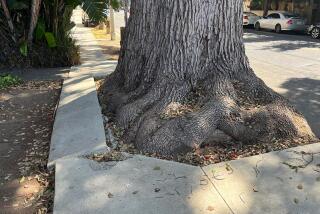Bike lanes go CEQA-free: Is that a good thing?
It will be even easier for cities to make over their streets to be more friendly to cyclists and pedestrians now that Gov. Jerry Brown has signed a bill exempting bicycle transportation plans from CEQA, Californiaâs storied and controversial environmental quality act.
Are we sure thatâs a good thing?
Brown signed a bill last year that blocks traditional full-scale environmental review and lawsuits to stop restriping of streets for bikes whenever that work is consistent with a cityâs bicycle transportation plan. There must still be traffic and safety analyses, and there must still be public hearings. Besides, the transportation plans themselves were subject to CEQA review.
But not anymore. Under AB 417 by Assemblyman Jim Frazier, a Democrat from Contra Costa County, those plans donât have to undergo CEQA review either.
FULL COVERAGE: Sharing the road in L.A.
The exemption is good for five years.
AB 417 may seem minor when compared to a more sweeping CEQA overhaul, adopted at the tail end of the legislative session, to exempt projects to be built near transit stops. But it comes during a period in which cities are moving rapidly to add bike lanes, slow traffic and generally work to comply with a 2008 Complete Streets mandate that roadways accommodate more kinds of transportation -- multi-modal, with room for pedestrians, cyclists, seniors, children, the disabled -- than merely cars.
Cities large and small have rapidly painted bike lanes, to the approval of cyclists and the anxiety of drivers who believe they are losing their grip on the road. Los Angeles, the supposedly bike-backward city, has moved forward with great speed to restripe, making use of last yearâs bill, while bike-oriented San Francisco has been more sluggish.
The CEQA exemptions pit environmentalists against one another, at least to an extent. Many enviros no doubt support plans to bring automobiles and their attendant exhaust under control and to promote cycling as a more Earth-friendly choice. But not necessarily if that means chipping away at the crown jewel of Californiaâs environmental protection laws.
In an editorial early in the legislative year, The Times cautioned against rushing into a perhaps unneeded, wholesale revamp of environmental laws. Yes, frivolous lawsuits are brought under CEQA. But reforming the law, we said, ârequires striking a delicate balance between preserving its protections and curbing its unnecessary job-killing costs and delays.â
Itâs hard to imagine much environmental damage being inflicted by striping a bike lane -- or by facilities for bike parking and storage, signal timing at intersections and signage, all of which are covered by Frazierâs bill. But then itâs also hard to imagine someone suing under CEQA to stop a bike lane.
But maybe I need a better imagination.
Richard Masoner at Cyclelicious expressed disappointment at the degree to which last yearâs bill was watered down -- and hope at the prospect of AB 417 finishing the job.
ALSO:
Counting Catholics in Congress
L.A.âs bike czar talks to drivers too
Democrats may be losing the PR battle
This post is part of an ongoing conversation to explore how the cityâs cyclists, drivers and pedestrians share and compete for road space, and to consider policy choices that keep people safe and traffic flowing. For more: latimes.com/roadshare and #roadshareLA.
More to Read
A cure for the common opinion
Get thought-provoking perspectives with our weekly newsletter.
You may occasionally receive promotional content from the Los Angeles Times.











